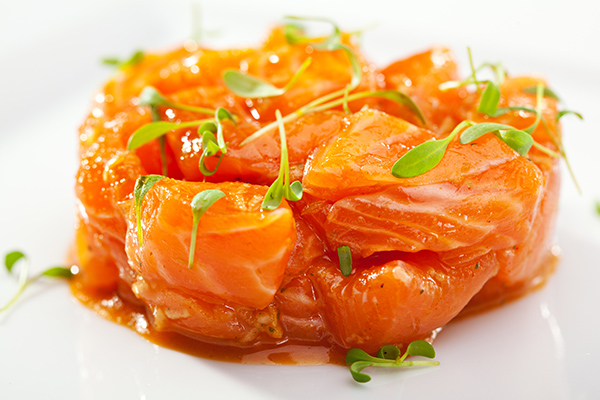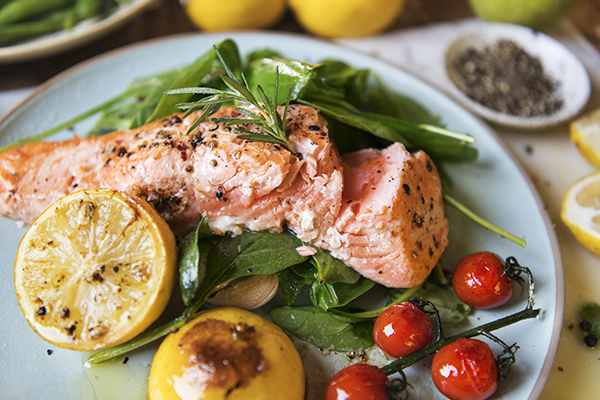Properties of salmon
Rich in Omega3, it is good for the heart and helps control cholesterol
fresh food
Share

Salmon is a type of migratory blue fish from the Salmonidae family that lives in both fresh and salt water. Its flesh has a characteristic pink colour and is highly appreciated for its flavour and nutritional qualities. You can find it throughout the year, since at the present time, almost all the salmon we consume in Spain comes from aquaculture, mainly from Norway, Scotland and Chile.
A strange fact about "wild" salmon is that they are born in fresh water, where the eggs are laid and, after a few years, they travel to the sea where they develop until they reach sexual maturity, and then they return to the place where they were born, going up the same river to lay eggs and repeat the cycle. This is the time when their flesh is in its best condition.
Nutritional value
Salmon is one of the healthiest foods in the world, as well as being very nutritious and tasty. It is an excellent source of vitamins B12, B6 and liposoluble vitamins D and E, high biological value proteins, essential fatty acids, and minerals such as iodine, phosphorus, selenium and potassium. Its carbohydrate content is very low.
How much Omega3 does salmon have?
Its content in polyunsaturated fatty acids is notable, particularly in Omega3. As its flesh has a high fat content of more than 5%, it is classified as oily fish. This gives it a higher energy value than that of other fish, which is why eating it once or twice a week is recommended.
Benefits of salmon
-As it is rich in Omega3, it is beneficial to the heart and circulatory system.
-Helps control cholesterol and triglyceride levels.
-Its vitamins contribute to the normal functioning of the nervous system.
-Its iodine content helps the thyroid to function properly.
-As it has phosphorus, it contributes to maintaining the bones in good condition.
-In addition, selenium helps the immune system to function properly.
Salmon is a type of oily fish. Due to its high fat content it is good for the heart and thanks to it is rich in Omega3, for controlling cholesterol.

Buying, conservation and cooking tips
- Salmon can be found fresh, frozen or smoked. To buy it fresh, check that its skin is shiny, with good colour, that the scales are firmly secured, the flesh is firm to touch and that the eyes are bright and bulging eyes.
- In general, fish is a food with a high bacterial load so it should be kept in the refrigerator to ensure that it remains chilled and cook it as soon as possible.
- To enjoy all the properties of salmon we recommend that you grill, cook or roast it and avoid frying, because excessive cooking influences the oxidation of its essential fats and would make it less beneficial.
From our website to your kitchen
-Salmon and scallops with coriander and lime
-Salmon pie
-Avocado and salmon salad
-Salmon en papillote
-Spaghetti with salmon
-Baked salmon with fennel
Find more recipes at Planificador de recetas
What is salmon oil?
It is a pure oil extracted from salmon flesh that concentrates all its qualities, such as Omega3 fatty acids, with a high content of EPA (Eicosapentaenoic Acid) and DHA (Docosahexaenoic Acid). Its mineral content can be up to 25 times higher than any other food of animal origin. Its main uses include as a vitamin supplement in pills and as a liquid oil to add to meals, but it can also improve the health of pets, such as dogs.
Properties of smoked salmon
Smoked salmon is a food rich in vitamin D that regulates the transfer of calcium to bones, and vitamin B3, which regulates normal energy metabolism. It is rich in sodium (20 to 25 times more than fresh salmon) and has a high protein content of high biological value. In contrast, smoked salmon it is low in sugar. It also has a notable contribution of potassium, phosphorus, magnesium and B group vitamins.






